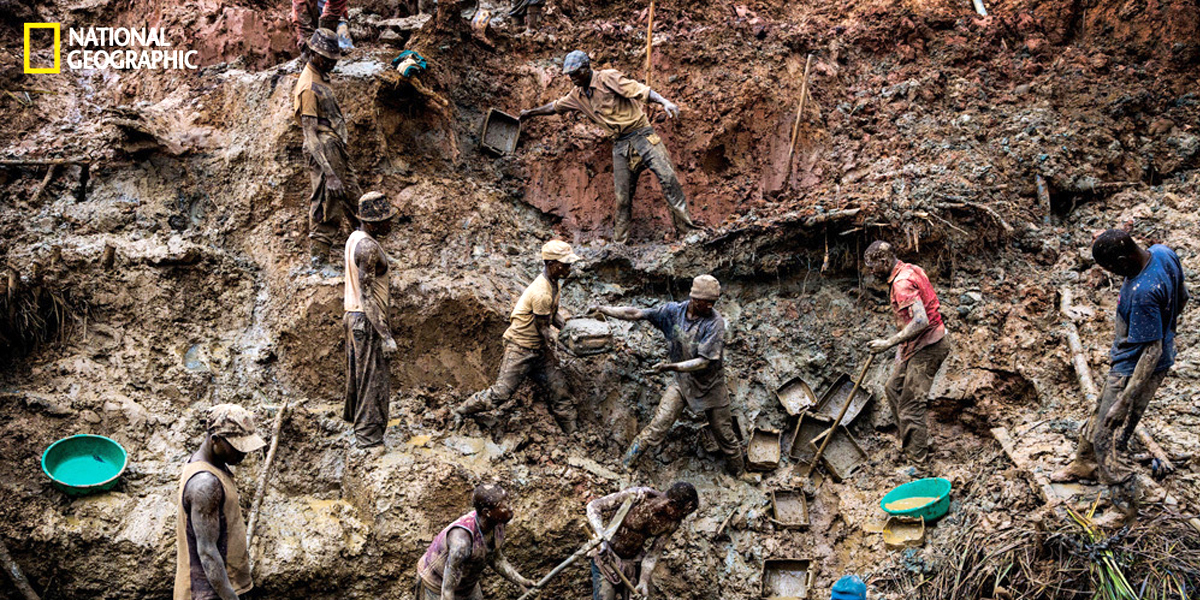

Workers rip the earth apart in search of gold at the Sufferance mine in the Ituri region. Much of Congo's gold, more than $600 million worth a year, is smuggled across borders. Photo credit: Marcus Bleasdale / National Geographic
By Lee Fang
The leaked draft of a presidential memorandum Donald Trump is expected to sign within days suspends a 2010 rule that discouraged American companies from funding conflict and human rights abuses in the Democratic Republic of Congo (DRC) through their purchase of “conflict minerals.”
The memo, distributed inside the administration on Friday afternoon and obtained by The Intercept, directs the Securities and Exchange Commission to temporarily waive the requirements of the Conflict Mineral Rule, a provision of the Dodd Frank Act, for two years—which the rule explicitly allows the president to do for national security purposes. The memorandum also directs the State Department and Treasury Department to find an alternative plan to “address such problems in the DRC and adjoining countries.”
The idea behind the rule, which had bipartisan support, was to drain militias of revenue by forcing firms to conduct reviews of their supply chain to determine if contractors used minerals sourced from the militias.
The impending decision comes as Trump held a meeting Wednesday with Brian Krzanich, the chief executive of Intel, one of the leading firms impacted by conflict mineral regulations. At the White House today, Krzanich appeared with the president to announce a new manufacturing plant in Arizona.
Human rights advocates—who had celebrated the conflicts rule as a major step forward—were appalled.
“Any executive action suspending the U.S. conflict minerals rule would be a gift to predatory armed groups seeking to profit from Congo’s minerals as well as a gift to companies wanting to do business with the criminal and the corrupt,” said Carly Oboth, the policy adviser at Global Witness, in a statement responding to a Reuters article that first reported the move.
“It is an abuse of power that the Trump administration is claiming that the law should be suspended through a national security exemption intended for emergency purposes. Suspending this provision could actually undermine U.S. national security.”
Advanced computer chips, including technology used in cell phones and semiconductors, contain minerals often sourced from war-torn countries in central Africa. Firms such as Intel, Apple, HP and IBM use advanced chips that contain tantalum, gold, tin and tungsten—elements that can be mined at low prices in the the DRC, where mines are often controlled by militias fueling a decades long civil war.
https://twitter.com/EcoWatch/status/775810075818622976
American tech companies, such as Intel, lobbied directly on the rule when it was proposed. But since passage, tech firms have largely used third party business groups to stymie the rule. Trade groups representing major U.S. tech firms and other manufacturers, including the U.S. Chamber of Commerce and the Business Roundtable, attempted to block the rule through a federal lawsuit. In 2014, a federal court struck down a part of the rule that forced firms to reveal DRC conflict minerals on their corporate websites.
Intel is also one of the firms that has touted its effort to comply with the law, publishing a report that notes the company has conducted 40 on-site reviews of smelters in the eastern DRC.
Reuters also reported that acting SEC chief Michael Piwowar has taken steps to also weaken enforcement, asking staff to “reconsider how companies should comply.”
Reposted with permission from our media associate The Intercept.

 233k
233k  41k
41k  Subscribe
Subscribe 